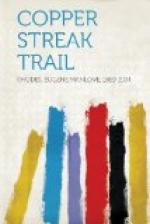CHAPTER III
The world was palpably a triangle, baseless to southward; walled out by iron, radiant ramparts—a black range, gateless, on the east; a gray range on the west, broken, spiked, and bristling. At the northern limit of vision the two ranges closed together to what seemed relatively the sharp apex of the triangle, the mere intersection of two lines. This point, this seemingly dimensionless dot, was in reality two score weary miles of sandhills, shapeless, vague, and low; waterless, colorless, and forlorn. Southward the central desert was uninhabitable; opinions differed about the edges.
Still in Arizona, the eye wearied; miles and leagues slid together to indistinguishable inches. Then came a low line of scattered hills that roughly marked the Mexican border.
The mirage played whimsical pranks with these outpost hills. They became, in turn, cones, pyramids, boxes, benches, chimney stacks, hourglasses. Sometimes they soared high in air, like the kites of a baby god; and, beneath, the unbroken desert stretched afar, wavering, misty, and dim.
Again, on clear, still days, these hills showed crystalline, thin, icy, cameo-sharp; beyond, between, faint golden splotches of broad Sonoran plain faded away to nothingness; and, far beyond that nothingness, hazy Sonoran peaks of dimmest blue rose from illimitable immensities, like topmasts of a very large ship on a very small globe; and the earth was really round, as alleged.
It was fitting and proper that the desert, as a whole, had no name: the spinning earth itself has none. Inconsiderable nooks and corners were named, indeed—Crow Flat, the Temporal, Moonshine, the Rinconada. It should rather be said, perhaps, that the desert had no accepted name. Alma Mater, Lungs called it. But no one minded Lungs.
Mr. Stanley Mitchell woke early in the Blue Bedroom to see the morning made. He threw back the tarpaulin and sat up, yawning; with every line of his face crinkled up, ready to laugh for gladness.
The morning was shaping up well. Glints of red snapped and sparkled in the east; a few late stars loitered along the broad, clean skies. A jerky clatter of iron on rock echoed from the cliffs. That was the four hobbled horses, browsing on the hillside: they snuffed and snorted cheerfully, rejoicing in the freshness of dawn. From a limestone bluff, ten feet behind the bed, came a silver tinkle of falling water from a spring, dripping into its tiny pool.
Stan drew in a great breath and snuffed, exactly as the horses snuffed and from the same reason—to express delight; just as a hungry man smacks his lips over a titbit. Pungent, aromatic, the odor of wood smoke alloyed the taintless air of dawn. The wholesome smell of clean, brown earth, the spicy tang of crushed herb and shrub, of cedar and juniper, mingled with a delectable and savory fragrance of steaming coffee and sizzling, spluttering venison.




